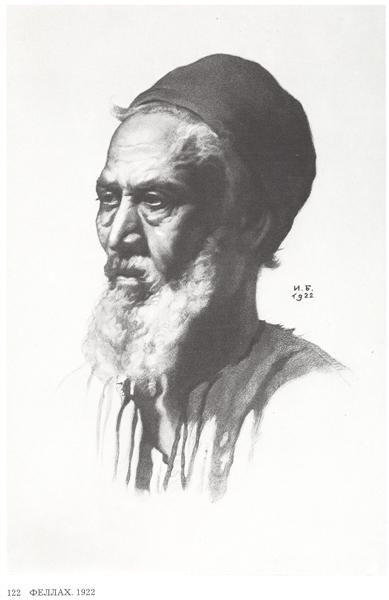Description
Ivan Bilibin, one of the great exponents of Russian art of the twentieth century, offers in his work "Fellah" in 1922 a fascinating look towards the exotism of the Middle East. This artist, known for his collaboration with the Russian Ballets of Diaghilev and his illustrations of Russian traditional stories, demonstrates in this painting his ability to capture various cultures and landscapes with a distinctive style that mixes decorative rigor with a deep ethnographic sensibility.
"Fellah", a Arab term that refers to a farmer, portrays a man in the context of a desert, although the title and work itself suggest an Egyptian environment. The male figure is dressed in traditional clothing, which Bilibin plasma with notable detail and precision. The folds of the fabric, the texture, and even the geometric patterns of the clothing are working thoroughly, which contributes to the composition an almost palpable authenticity.
The central character is standing, in a posture that suggests dignity and, perhaps, introspection. Behind him, the background is concise but significant: an immense palette of warm colors that represent the desert, and a line of the clean horizon that separates the sky from the vast sandy terrain. Despite the simplicity of the environment, Bilibin manages to convey an intense sensation of immensity and loneliness that emphasizes the lonely figure of Fellah.
The use of color in "Fellah" is masterful. The range of terrible and reddish tones not only defines the desert scene, but is also used expressively to give warmth and life to the image. The nuances of the Fellah outfit contrast gently with the monotonous landscape atmosphere, and this attracts the viewer's gaze towards the protagonist of the work.
Bilibin, formed at the Academy of Fine Arts of St. Petersburg, was a master of the illustration and a great researcher of the decorative elements of different cultures. His artistic approach was deeply rooted in the study of traditional ornaments and styles, not only of Russia but also other parts of the world. "Fellah" is a clear example of how Bilibin incorporates these studies in his art, presenting a harmonious mixture between realism and decorative stylization.
It is important to mention that Ivan Bilibin was in Egypt at the time he painted this work. Attracted by both the landscapes and the people of the place, he found in Egypt a continuous source of inspiration, and "Fellah" must be seen as part of a broader dialogue between the artist and the world that surrounded him. In fact, many of the works that Bilibin carried out during his stay in Egypt reflects a similar fascination for the landscapes and the people who lived those places so different from their homeland.
In sum, "Fellah 1922" by Ivan Bilibin is much more than a simple painting of a farmer from the Middle East; It is a work that encapsulates the artist's ability to transfer the essence of distant cultures with a precision and sensitivity that transcend the mere portrait to the canvas. The composition, the use of color and cultural depth of the work highlights Bilibin not only as an outstanding illustrator, but also as a visual interpreter of universal human stories through their unique eyes.
KUADROS ©, a famous paint on your wall.
Hand-made oil painting reproductions, with the quality of professional artists and the distinctive seal of KUADROS ©.
Art reproduction service with satisfaction guarantee. If you are not completely satisfied with the replica of your painting, we refund your money 100%.

